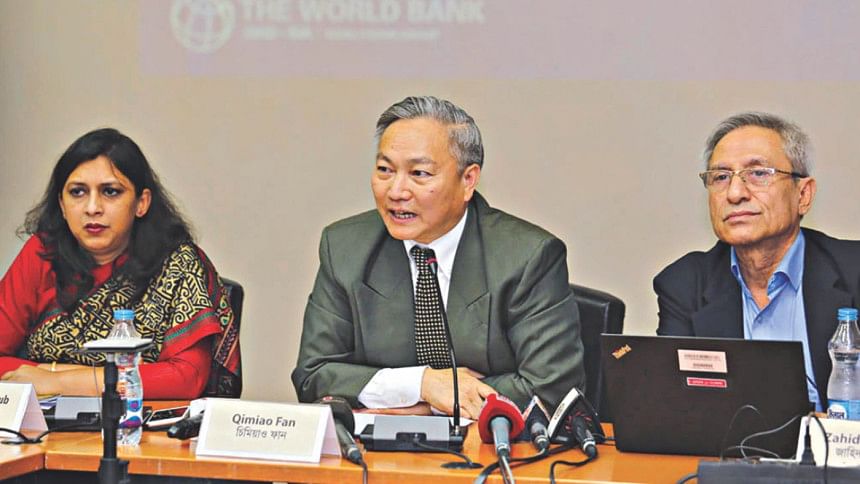WB doubts 7.65pc GDP growth estimate

The World Bank yesterday questioned the 7.65 percent economic growth estimate being peddled by the Bangladesh Bureau of Statistics for fiscal 2017-18, raising doubts over claims of robust expansion of the manufacturing sector and domestic demand.
It is being said that the manufacturing sector is growing faster than last year. But the Washington-based multilateral lender said production capacity has not increased from last year as private investment has remained almost stagnant.
"It is also difficult to believe that there was excess production capacity," said Zahid Hussain, lead economist of the World Bank's Dhaka office, while presenting the 'Bangladesh Development Update' at a press conference in the capital.
The WB also raised doubts over the estimate of 7-8 percent growth of domestic demand. The possible explanations behind such spike in growth could be either growth of employment and labour income or a rise in remittance inflows.
"But we do not see any leap in any of these cases," he said, citing the growth of employment in 2017 to be 2.2 percent and labour income 2.7 percent.
While the remittance inflows have recovered, the level of remittance still remains 2.7 percent less than in the July-March period of fiscal 2015-16.
"If consumer demand grows, where is the source of the growth?"
Last week, the BBS said the economy is on course for a 7.65 percent growth, driven by double-digit growth in manufacturing and construction sectors.
This is the third consecutive year that the economic growth was above 7 percent after years of languishing in the neighbourhood of 6 percent.
The WB said the latest growth estimate is exceeding Bangladesh's potential GDP growth of 6.5-6.6 percent.
While the economy has remained robust owing to rebound in exports and remittance and strong performance of the agriculture sector, the service sector, whose contribution to the GDP is about 52 percent, has slowed down this year.
Private investments are not taking off yet: it is projected to increase to 23.25 percent of GDP in fiscal 2017-18 from 23.1 percent a year ago, said the WB.
In addition, rising inflation, interest rates on loans, rising default loans, large external deficit resulting from soaring imports payments, revenue shortfall and pressure on expenditures for rising subsidies, the elections and spending on the Rohingyas have made macroeconomic outlook challenging.
"And the banking sector woes remain unattended," Hussain said.
The multilateral lender went on to criticise the recent moves of the government to boost the banking sector.
"These are on balance expansionary actions that are hard to justify when growth is already above the potential, inflation is rising and the exchange rate is depreciating."
The WB also flagged the issue of slowing pace of poverty reduction although the economy is growing at a faster pace in recent years.
The annual pace of poverty reduction fell from 1.7 percentage points in 2005-10 to 1.2 percentage points in 2010-16, despite 6.1-6.5 percent GDP growth during the latter period.
At the same time, inequality increased.
"Welfare differences between the historically poorer west and the rest of the country have re-emerged," Hussain said.
Looking forward, Bangladesh's outlook is positive for factors such as progress in key infrastructure projects, rising shipment of higher value-added garment items and prospect of a spike in remittance.
The multilateral lender suggested regulatory reforms in the banking sectors to address the poor risk practices, corruption and collusion.
It also called for a cautious monetary policy approach and exchange rate flexibility.
"Exchange rate flexibility and monetary policy independence can mitigate external risks. Increased caution on the monetary policy stance is needed given the concerns on rising inflation, surging global crude oil prices and fiscal slippage," Hussain said.
Despite having floods twice impacting agriculture, Bangladesh maintained robust growth in the current fiscal year, said Qimiao Fan, country director of the WB.
But, actions are needed to address some emerging challenges.
For instance, tax revenue as a share of GDP remains among the lowest in the world.
"As the economy generates the wealth of a middle-income country, it also needs to generate the revenue for public services and investment of a middle-income country."
The medium-term revenue strategy development process launched by the National Board of Revenue last week was a positive step in this regard, Qimiao said.
He was also critical of the government's high reliance on National Savings Certificates to meet a part of the budget deficit.
"The means of financing the deficit, mainly through issuance of National Savings Certificates, has become increasingly expensive. It also brings significant distortions in the financial sector, which is facing tightening liquidity and double-digit lending rates."
He also stressed maintaining sound, credible data and monitoring systems to underpin evidence-based policy making.
These include not only data for poverty measurement and tracking, but also data on the national income accounts, inflation and the budget.

 For all latest news, follow The Daily Star's Google News channel.
For all latest news, follow The Daily Star's Google News channel. 



Comments